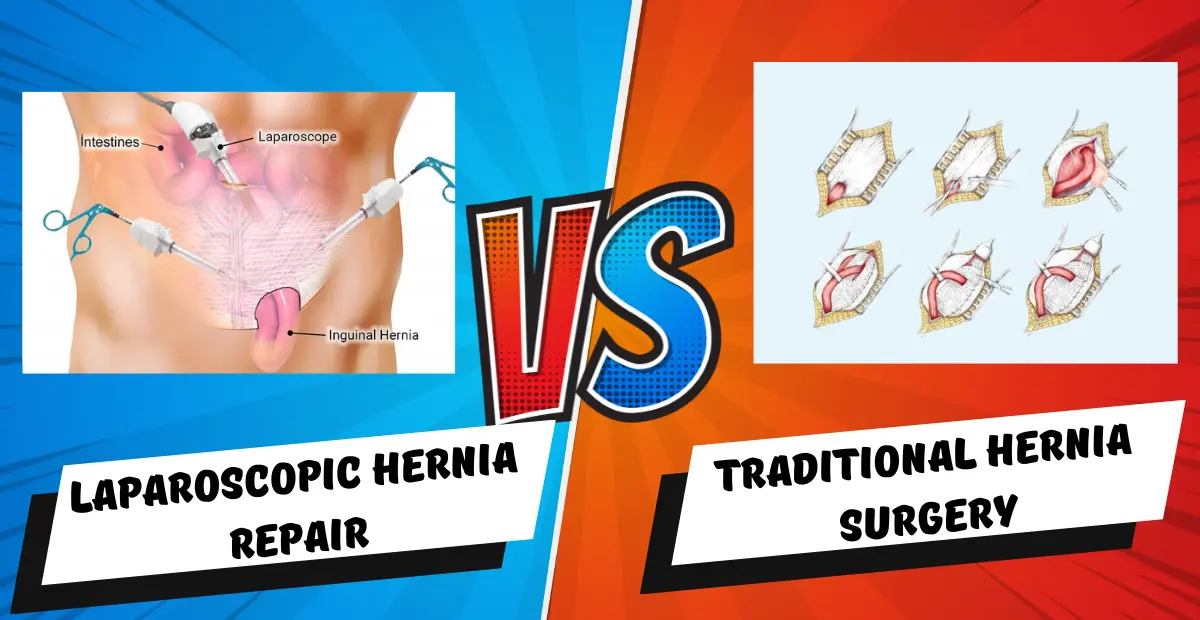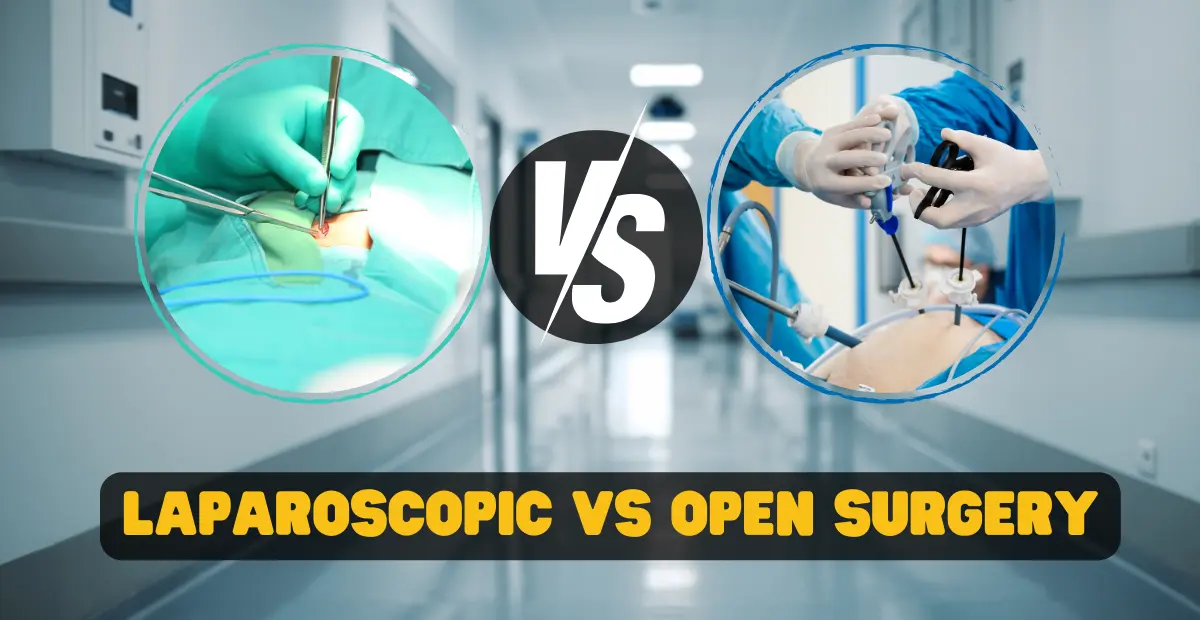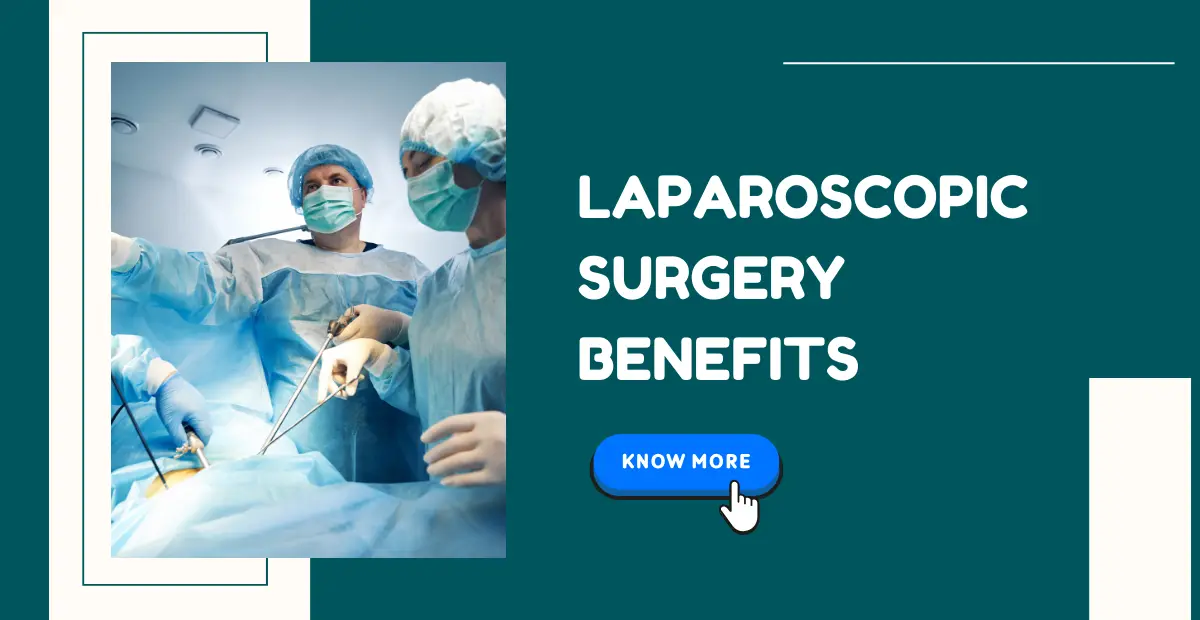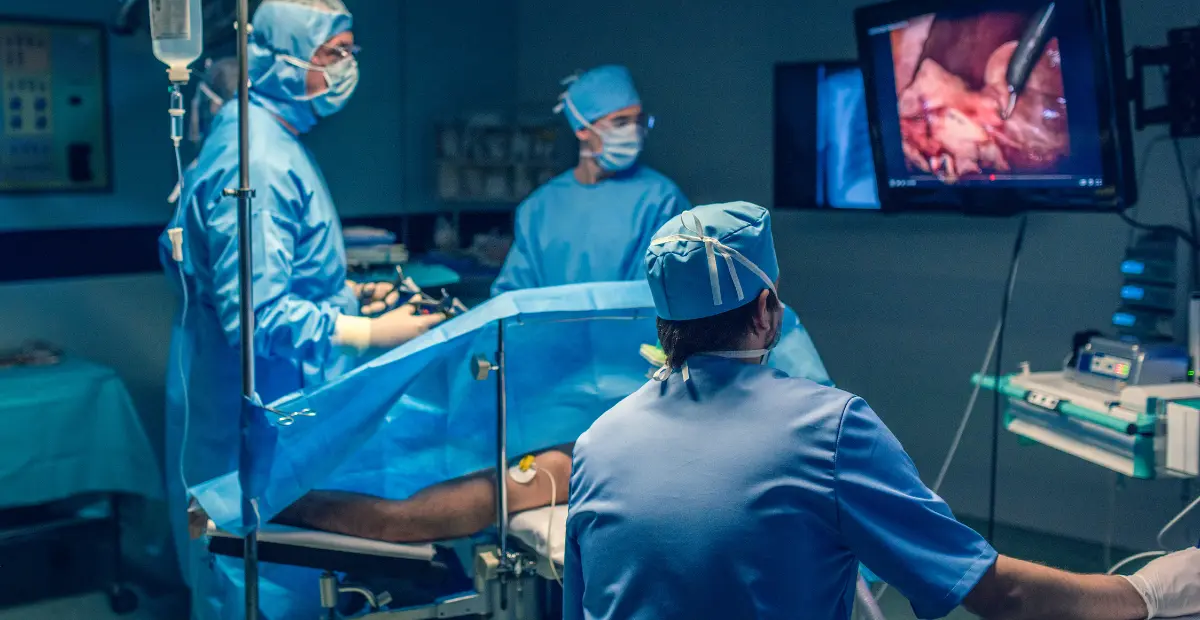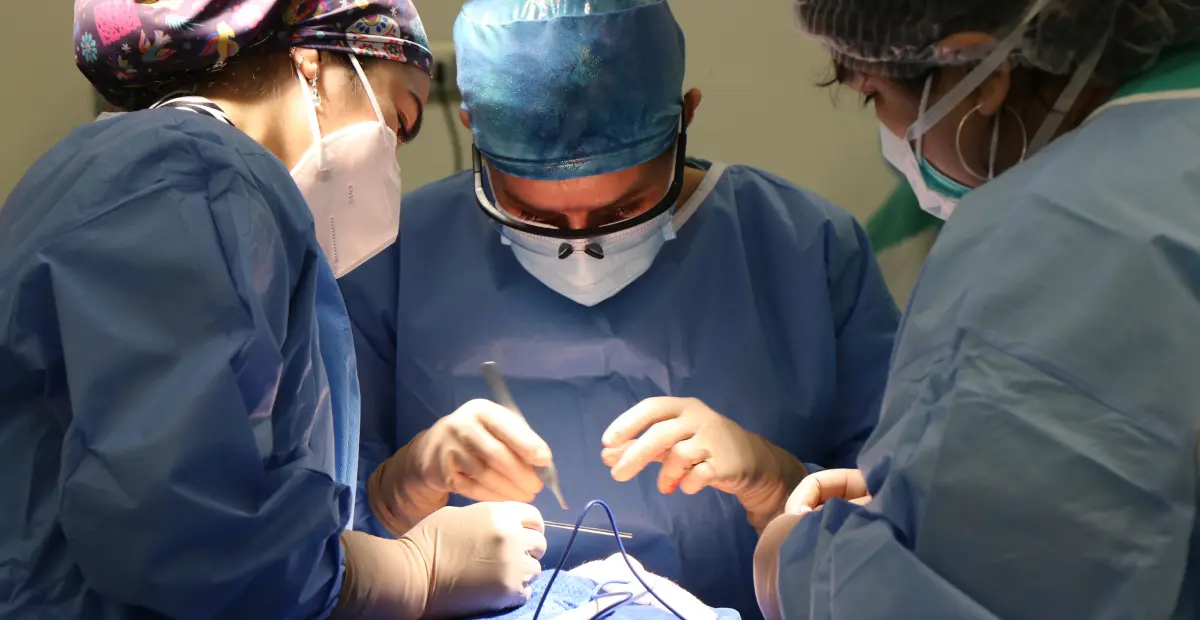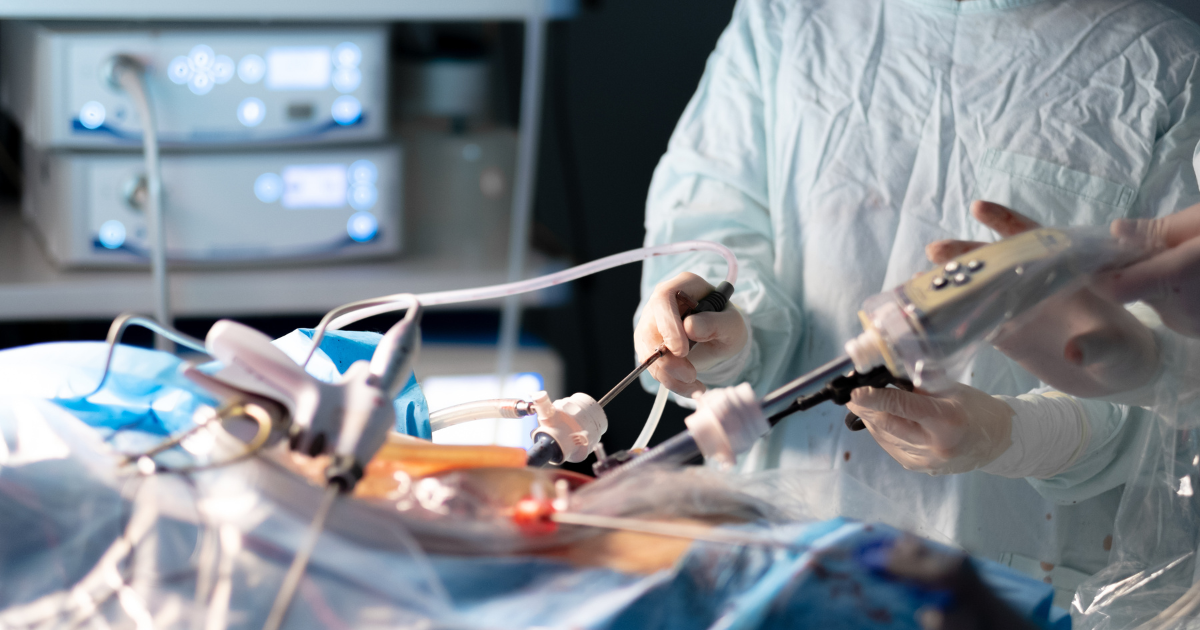Laparoscopic Surgery in Chennai
Reach out Us
Laparoscopic Surgery in Chennai
Laparoscopic surgery — also known as minimally invasive surgery — is a modern surgical technique that uses small keyhole incisions, a high-definition camera, and advanced instruments to diagnose and treat various abdominal and pelvic conditions. Compared to traditional open surgery, laparoscopy offers less pain, faster recovery, minimal blood loss, and reduced hospital stay, making it the preferred choice for patients seeking safe and effective treatment.
Today, most people choosing laparoscopic surgery in Chennai prefer a surgeon who offers high-precision techniques, proven results, and a compassionate care experience. That is exactly why patients across Tamil Nadu trust Dr. Sundhar — a leading laparoscopic surgeon known for his expertise, modern surgical approach, and patient-first care.

What Is Laparoscopic (Keyhole) Surgery?
Laparoscopy allows the surgeon to operate through small cuts (usually 0.5–1.5 cm) using a camera and fine instruments. The camera sends a clear view to a monitor, helping the team work with accuracy while causing less tissue damage. For many procedures, this means smaller scars, less pain, a shorter hospital stay, and a faster return to routine activities.
Conditions We Treat with Laparoscopic Surgery
We offer comprehensive laparoscopic treatments for various medical conditions, including:
✅ Gallbladder Removal (Laparoscopic Cholecystectomy) – For gallstones and gallbladder diseases
✅ Appendix Removal (Laparoscopic Appendectomy) – Treatment for appendicitis
✅ Hernia Repair (Laparoscopic Hernioplasty) – Inguinal, umbilical, and abdominal hernias
✅ Gastrointestinal Surgeries – Treatment for ulcers, tumors, and other digestive issues
✅ Gynecological Procedures – Ovarian cyst removal, hysterectomy, and fibroid surgery
✅ Bariatric (Weight-Loss) Surgery – Non-surgical obesity treatment
✅ Laparoscopic Cancer Surgery – Non-surgical techniques for tumor removal
Conditions We Treat with Laparoscopic Surgery in Chennai
✅ Gallbladder: Laparoscopic cholecystectomy for gallstones and gallbladder inflammation
✅ Hernias: Inguinal, umbilical, and ventral/incisional hernias; mesh or non-mesh as indicated
✅ Appendix: Laparoscopic appendectomy for acute appendicitis
✅ Reflux/Hiatal Hernia: Anti-reflux surgery (e.g., fundoplication) in selected patients
✅ Adhesions/Diagnostic: Adhesiolysis and diagnostic laparoscopy for unclear abdominal pain
✅ Select Colorectal & Gynec Procedures: Performed by/with the right specialist when needed
Not every case is suited to laparoscopy. After reviewing your tests and health history, we will recommend the safest option for you.
Why Choose Laparoscopic Surgery?
✅ Minimal Scarring – Tiny incisions lead to barely visible scars
✅ Reduced Pain – Less post-surgical discomfort compared to open surgery
✅ Faster Recovery – Shorter hospital stay and quicker return to normal activities
✅ Lower Risk of Infections – Small incisions reduce exposure to infections
✅ Precision & Accuracy – High-definition camera ensures better surgical accuracy
Why Choose Dr. Sundhar for Laparoscopic Surgery?
Choosing the right surgeon makes all the difference — when precision, speed of recovery and patient-care matter, you want a specialist who combines expertise, experience and compassion.
That’s exactly what you get with Dr. Sundhar — one of Chennai’s trusted minimally-invasive surgical specialists, blending advanced laparoscopic techniques, modern regenerative approaches and a patient-first mindset.
Years of Experience
With over 13 years of surgical practice, Dr. Sundhar has been regularly performing laparoscopic and gastrointestinal surgeries, diagnosing complex cases, and guiding patients through pre-operative and post-operative care with confidence.
Surgeries Handled & Expertise
Dr. Sundhar has managed numerous laparoscopic procedures — from gallbladder removals and hernia repairs, to advanced GI and colorectal surgeries — reflecting his deep practical experience in minimally invasive care. His strong procedural volume gives patients added reassurance and reliability.
Areas of Specialisation
His key specialization areas include:
-
-
-
Laparoscopic gallbladder surgery (cholecystectomy)
-
Laparoscopic hernia repair
-
Coloproctology (laparoscopic treatments for intestinal/anal disorders)
-
Diagnostic laparoscopy and GI surgery
-
Regenerative surgical therapies integrated with minimally invasive techniques
-
-
Because of this wide span, patients with different abdominal or pelvic conditions can find the right solution under one roof.
Proven Outcomes & Patient-First Approach
While no single number covers every case, Dr. Sundhar is recognised for achieving excellent outcomes, low complication rates and rapid recovery times. His patient reviews, referrals and repeat care all reflect a trusted track-record for safe, effective laparoscopic surgery in Chennai.
Hospital Affiliation & Facilities
Dr. Sundhar is affiliated with the Dr Sundhar Surgical & Regenerative Centre in Chennai — a facility equipped with modern operating theatres, HD laparoscopic systems, full-scale monitoring, 24/7 support, and integrated post-operative care. Choosing a surgeon with high-end facility backing means you get both surgical expertise and the infrastructure needed for safe recovery.
Meet Dr. Sundhar – Leading Laparoscopic Surgeon in Chennai
Dr. N. Sundharrajan, widely known as Dr. Sundhar, is a highly trusted minimally invasive and gastrointestinal surgeon with over 13 years of clinical experience and a strong track record of successful surgical outcomes. Recognized as a leading laparoscopic surgeon in Chennai, he is known for combining modern surgical techniques with compassionate, patient-focused care.
He is extensively trained in laparoscopic gallbladder surgery, hernia repair, appendix removal, colorectal procedures, and advanced gastrointestinal treatments. Over the years, he has treated thousands of patients with conditions ranging from simple abdominal issues to complex digestive disorders, ensuring safe, precise, and effective results.
Apart from his surgical expertise, Dr. Sundhar is appreciated for his clear communication, ethical medical approach, and commitment to providing individualized care. His affiliation with Dr Sundhar Surgical & Regenerative Centre, equipped with advanced laparoscopic infrastructure and safety-enhanced operating theatres, further strengthens the quality of treatment patients receive.
Whether you are seeking advanced laparoscopic surgery or need a trustworthy specialist for accurate diagnosis and guidance, Dr. Sundhar ensures a smooth and reliable treatment journey from consultation to complete recovery.
Conditions Treated with Laparoscopic Surgery
Laparoscopic surgery is a versatile minimally invasive technique used to diagnose and treat a wide range of abdominal and pelvic conditions. It allows patients to recover faster, experience less pain, and return to normal activities sooner compared to traditional open procedures.
At Dr. Sundhar Surgical & Regenerative Centre, the following conditions are commonly treated through advanced laparoscopic methods:
-
-
-
Gallbladder removal (Laparoscopic cholecystectomy) – the safest and most effective approach for treating gallstones and gallbladder inflammation
-
Hernia repair – including inguinal, umbilical, ventral, and incisional hernias
-
Appendix removal (Laparoscopic appendectomy) – preferred for treating acute or recurrent appendicitis
-
Ovarian cyst removal – minimally invasive treatment for benign ovarian cysts, endometriotic cysts, and functional cysts
-
Hysterectomy – laparoscopic removal of the uterus for fibroids, adenomyosis, heavy bleeding, or other gynecological concerns
-
Bariatric procedures – minimally invasive weight-loss surgeries for long-term obesity management
-
Diagnostic laparoscopy – used to evaluate unexplained abdominal or pelvic pain, internal bleeding, infertility, or adhesions
-
-
This wide scope of procedures ensures that patients receive accurate diagnosis and effective treatment tailored to their condition, all with enhanced safety and faster recovery.
How Laparoscopic Surgery Works
Laparoscopic surgery is a modern surgical technique designed to treat abdominal and pelvic conditions through small keyhole incisions instead of traditional open cuts. This minimally invasive approach ensures greater precision, quicker recovery, and reduced complications for the patient.
During the procedure, the surgeon creates tiny 0.5–1 cm incisions through which a high-definition camera (laparoscope) and thin, specialized instruments are inserted. The camera provides a magnified, real-time view of the internal organs on a monitor, allowing the surgeon to perform the entire procedure with enhanced accuracy.
Because the incisions are small, patients experience less pain, minimal tissue trauma, and significantly reduced blood loss during surgery. This also means fewer stitches, lower chances of infection, and a more comfortable post-operative experience.
Another major advantage is the faster healing — most laparoscopic procedures allow patients to return to normal activities much sooner compared to traditional open surgery.
Overall, laparoscopic surgery offers a safe, effective, and modern alternative for a wide range of conditions, making it the preferred choice for both surgeons and patients.
Benefits of Laparoscopic Surgery
Laparoscopic surgery offers several advantages over traditional open procedures, making it the preferred choice for safe and effective treatment. The key benefits include:
-
-
Faster recovery – because tissues undergo less trauma, patients heal quicker and can return to routine activities sooner.
-
Short hospital stay – most laparoscopic procedures allow for same-day discharge or a significantly reduced hospital stay.
-
Minimal scarring – tiny keyhole incisions result in small, almost invisible scars, improving cosmetic outcomes.
-
Less postoperative pain – reduced tissue damage leads to lower pain levels, improving overall comfort during recovery.
-
These advantages make laparoscopic surgery a safe, efficient, and patient-friendly option for a wide range of abdominal and pelvic conditions.
Laparoscopic Surgery Cost in Chennai
The cost of laparoscopic surgery in Chennai can vary based on several important medical and facility-related factors. Since each patient’s condition and surgical requirement are different, the final cost is determined only after a proper evaluation. The key factors that influence the pricing include:
1. Procedure Type
Different laparoscopic procedures — such as gallbladder removal, hernia repair, appendix removal, ovarian cyst removal, or gynecological surgeries — have different levels of complexity. More advanced or longer procedures may have higher associated costs.
2. Hospital Facilities
The quality of the operating theatre, availability of high-definition laparoscopic systems, anesthesia monitoring, and post-operative care facilities also play a major role in determining the final cost.
3. Surgeon Expertise
Experienced surgeons with a strong track record, advanced qualifications, and high case success rates may have different professional fees. Choosing an expert ensures greater safety and better surgical outcomes.
4. Surgical Consumables and Equipment Used
Laparoscopic surgery requires specialized instruments, disposable ports, high-quality sutures, and other consumables. These items directly impact the total procedure cost.
5. Room Type and Hospital Stay
Whether the patient chooses a general ward, twin-sharing room, or private room can influence the overall billing. Although most laparoscopic surgeries require only a short stay, room preferences still affect cost.
For an accurate and personalized estimate based on your condition:
Contact us to know the exact laparoscopy surgery cost for your condition.
Best Laparoscopic Surgery Hospital in Chennai
When it comes to choosing the best laparoscopic surgery hospital in Chennai, patients look for a centre that prioritizes safety, precision, modern technology, and 24/7 medical support. Dr. Sundhar Surgical & Regenerative Centre is designed to meet all these standards, offering world-class minimally invasive treatment backed by experienced surgical care.
Hospital Name & Reputation
Dr. Sundhar Surgical & Regenerative Centre is a dedicated facility known for delivering reliable laparoscopic treatments, focused patient care, and consistent surgical outcomes. The centre is committed to providing evidence-based, ethical, and safe medical practice.
Advanced Technology & Infrastructure
The hospital is equipped with:
-
-
HD & 4K laparoscopic systems for enhanced visualization
-
High-precision surgical instruments for safe minimally invasive procedures
-
Modern anesthesia monitoring systems for patient safety
-
Well-maintained sterile operation theatres to reduce infection risk
-
This advanced infrastructure ensures accurate diagnosis, safe surgery, and optimal recovery.
Strict Safety Protocols
To protect every patient, the hospital follows:
-
-
WHO-recommended sterilization protocols
-
Pre- and post-operative safety checklists
-
Infection-control standards
-
Continuous monitoring during surgery and recovery
-
These ensure that every laparoscopic procedure is carried out with maximum safety.
Comprehensive Patient Support
The centre provides:
-
-
A fully equipped Intensive Care Unit (ICU)
-
State-of-the-art Operation Theatres (OT)
-
24/7 emergency and nursing support
-
Dedicated post-operative care
-
Pain-management and recovery monitoring
-
This complete care system helps patients feel secure from the moment they enter the hospital until full recovery.
If you are looking for the best combination of surgical expertise, modern technology, and compassionate care, Dr. Sundhar Surgical & Regenerative Centre stands as a trusted choice for laparoscopic treatment in Chennai.
Patient Journey: From Consultation to Recovery
At Dr. Sundhar Surgical & Regenerative Centre, every patient is guided through a structured, transparent, and supportive treatment pathway. This ensures clarity, comfort, and confidence at every stage of the laparoscopic surgery process.
Step 1 – Consultation & Diagnosis
Your journey begins with a detailed consultation where Dr. Sundhar reviews your symptoms, medical history, and previous reports. Depending on your condition, diagnostic evaluations such as blood tests, ultrasound, CT scan, or endoscopy may be recommended.
This step helps identify the exact cause of your discomfort and determine whether laparoscopic surgery is the best treatment option for you.
Step 2 – Pre-Surgery Evaluation
Once surgery is planned, a complete pre-operative assessment is conducted to ensure your body is ready for the procedure. This includes laboratory tests, fitness evaluation, anesthesia clearance, and medication review.
You will receive clear instructions regarding fasting, medications, and pre-surgery precautions to ensure a smooth and safe procedure.
Step 3 – Laparoscopic Procedure
On the day of surgery, you will be guided to the operating theatre by the medical team. After administering anesthesia, Dr. Sundhar performs the procedure using small incisions, a high-definition laparoscope, and precision instruments.
Throughout the surgery, vital parameters are closely monitored to ensure maximum safety. Because the procedure is minimally invasive, tissue damage is minimal, resulting in less pain and faster healing.
Step 4 – Recovery & Follow-up Care
After the procedure, the nursing team assists you as you rest in the recovery room. Most patients can walk within a few hours and may be discharged the same day or the next, depending on the surgery type.
You will receive detailed instructions on diet, wound care, activity levels, and medications. Follow-up visits allow Dr. Sundhar to monitor your healing, ensure proper recovery, and answer any questions you may have.
This structured patient journey ensures that you receive expert care at every step, from the first consultation to complete recovery.
Before & After — Patient Testimonials
Many patients have experienced smooth recovery, reduced pain, and improved quality of life after undergoing laparoscopic treatment with Dr. Sundhar.
Book Your Appointment Online
If you’re experiencing abdominal discomfort, digestive issues, or have been advised to undergo laparoscopic surgery, timely consultation can help you get the right treatment with minimal pain and faster recovery.
Dr. Sundhar and his team are here to guide you with expert diagnosis, advanced surgical care, and complete post-operative support.
Choose your preferred way to reach us:
📞 Call Us
Speak directly with our care coordinator to schedule an appointment or clarify your doubts.
Phone: +91 72000 92454
💬 WhatsApp Us
Send your reports, ask questions, or book a consultation instantly via WhatsApp.
WhatsApp: +91 72000 92454
📝 Book Consultation Form
Prefer online booking? Fill out our quick form and our team will get back to you shortly.
Frequently Asked Questions (FAQ)
What is the cost of laparoscopic surgery in Chennai?
Surgery costs in Chennai typically range from ₹35,000 to ₹1,00,000, depending on the complexity of the procedure, hospital facilities, and the patient’s specific needs.
Which is the best hospital for laparoscopic surgery in Chennai?
Dr. Sundhar Surgical & Regenerative Center is known for its state-of-the-art facilities, skilled surgical team, and patient-centric care, making it one of the top choices for laparoscopic treatment.
What are the benefits of choosing laparoscopic surgery over traditional open surgery?
Dr. N Sundharrajan is highly experienced in gynecological laparoscopic surgeon, providing safe and effective solutions for conditions like fibroids, endometriosis, and ovarian cysts.
Is laparoscopic surgery safe?
Yes. It is widely practiced with strong safety records. Your overall health and the exact problem decide risk.
Will I have a catheter or drains?
Sometimes yes, depending on the procedure. We remove them as early as medically safe.
Will there be scars?
Small marks fade over time. Scar creams/sun protection can help once healing is complete.
When can I drive?
Usually after you stop pain medications and can move safely—often 3–7 days for minor procedures. Ask your surgeon for your case.
When can I return to work?
Desk jobs: 1–2 weeks. Physically demanding work: 2–4+ weeks, depending on the surgery.
What pain can I expect?
Mild–moderate pain at the small cuts is common and improves quickly with medicines.
Can all hernias be repaired laparoscopically?
Most can, but not all. Very large or complicated hernias may need open or hybrid repair.
What if laparoscopy has to be converted to open?
Rarely, for safety or better access. Your surgeon will explain if this happens and why.
Do I need to stop any medicines?
Blood thinners and certain drugs may need a pause. We coordinate with your physician.
Who performs the surgery?
A qualified laparoscopic surgeon leads your care with a trained OT and anesthesia team.
What facilities matter most for laparoscopic surgery?
High-definition camera systems, reliable insufflators, trained anesthesia, and strict sterile processing are key. Recovery monitoring and clear discharge advice also matter.
Is day-care surgery safe?
Yes, for selected patients. We use a checklist to ensure pain is controlled, you can walk, drink water, and have an adult to accompany you home.
Will I need mesh for a hernia repair?
Often yes, depending on the type and size of the hernia. Your surgeon explains options and safety.
How long will I stay in the hospital?
Many patients go home the same day or within 24–48 hours, based on the procedure and recovery.
What pain should I expect after surgery?
Mild to moderate pain near the small cuts is common and usually improves in a few days with medicines and walking.
What if laparoscopy has to convert to open?
Rarely, the plan changes to open for safety or better access. If this happens, the reason and next steps are explained to you and your family.
Do you coordinate with other specialists?
Yes. When needed, we involve gastroenterology, colorectal, or gynecology teams so your treatment is complete and timely.
How do I prepare for surgery?
Follow fasting instructions, take only approved medicines, and arrange a family member to accompany you. Bring all reports and ID.
Will the surgeon perform my operation personally?
Yes. Your named surgeon leads your care with a trained OT and anesthesia team.
How many cuts will I have?
Usually three to four small cuts. The number can change with the type of surgery.
Is laparoscopy safe for seniors or people with diabetes?
Many do well with proper planning. Your anesthetist will optimize your fitness and medicines.
When can I return to work?
Desk work is often possible in 1–2 weeks. Heavy work can take longer. Your plan will be personalized.
Which laparoscopic surgeon in Chennai will perform my operation?
Dr. N. Sundhar performs your operation personally, supported by a trained OT and anesthesia team.
Who is considered the best laparoscopic surgeon in Chennai for abdominal and gynae procedures?
Dr. N Sundharrajan at Dr. Sundhar Surgical & Regenerative Center is widely recognized for his expertise in both general and gynae laparoscopic treatments, offering advanced non-surgical strategies with excellent outcomes.
How do I find a laparoscopic surgeon near me in Chennai?
Dr. Sundhar Surgical & Regenerative Center is conveniently located in Alapakkam, Perungalathur, Chennai, making it easily accessible for patients searching for a “laparoscopic surgeon near me” in the city.
Who is the best gynae laparoscopic surgeon in Chennai?
Dr. N Sundharrajan is highly experienced in gynecological laparoscopic surgeon, providing safe and effective solutions for conditions like fibroids, endometriosis, and ovarian cysts.



